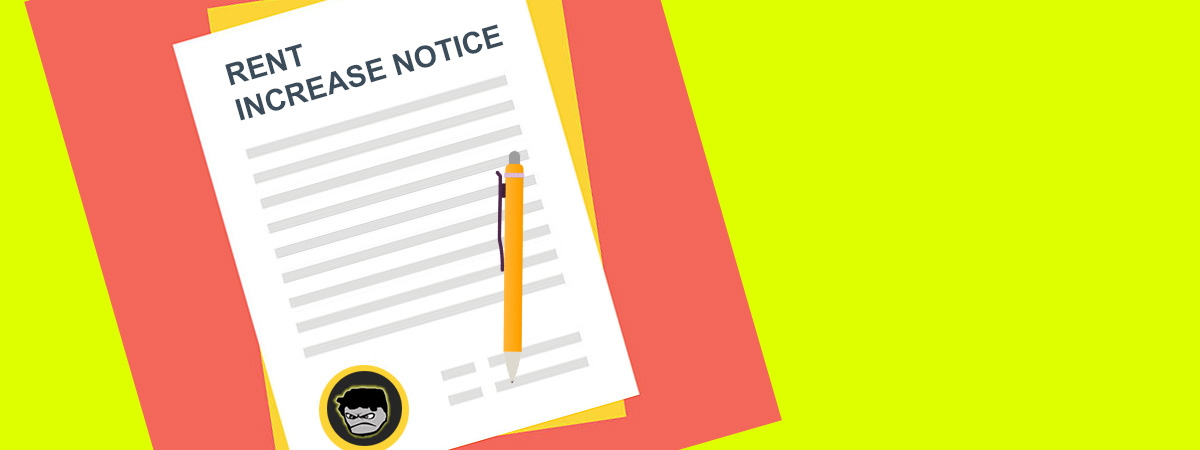They say the average person thinks about sex every 3 seconds. The average landlord thinks about increasing rent every 2 seconds.
There’s going to be a time in every established landlord’s career when they have to increase rent, meaning out of necessity, and not greed. Why? Simply, inflation.
Either way, whatever your motive may be to increase your tenant’s rent (although, I hope it’s for all the right reasons), it’s critical to follow the proper legal procedures by doing it the right way.
I’m not going to get into the ethics of rent increases, but rather focus purely on the process. But I will say this: every landlord should think carefully about applying rent increases, and only proceed with care and caution. It’s a blunt tool.

Page contents
- When can a landlord increase rent?
- What if the tenant disputes/rejects the rent increase?
- How much can the landlord increase rent by?
- Section 13 – Notice Of Rent Increase Form
- How much notice must landlords give to increase rent?
- How tenants can challenge rent increases
- Download free Rent Increase Section 13 Notice Template (England)
When can a landlord increase rent?
First and foremost, check your Tenancy Agreement, because it might contain rent increase clause(s). The procedure in the agreement should be followed.
If the tenancy agreement makes no provisions for rent increases, then the landlord has following options depending on the status of the tenancy:
If you’re in a Fixed term Tenancy
- If there is no “rent review” clause that can be applied during the fixed term, then the landlord cannot force a tenant to pay a new rate without their permission. The landlord can, however, propose a rent increase to take effect after the fixed-term has expired with Section 13 Rent Increase notice.
- Regardless of whether there is or isn’t a rent review clause [that can be applied during the fixed-term], the landlord and tenant can mutually agree on a rent increase. This should be agreed in writing, specifying the new rate and the commencement date. Both tenant and landlord should sign the document for the record. This is often referred to as a Rent Increase Agreement.
If you’re in a Statutory Periodic Tenancy (rolling on a week-by-week or month-by-month basis)
- Serve a Section 13 Rent Increase notice, giving the tenant a minimum of one months’ notice.
If you’re not sure what the hell you have, allow my guide on periodic tenancies to shed some light on the matter.
What if the tenant disputes/rejects the rent increase?
Assuming the proper procedures have been followed by the landlord, if the tenant is unhappy with the increase and is refusing to comply with the new terms (which they’re completely entitled to do), then the landlord can either backtrack with the proposed increase altogether, negotiate another rate, or serve a Section 21 notice to regain possession of the premises in order to find new tenants that are willing to pay the new rate.
I appreciate that there’s a strong case for increasing rent if you’re currently charging well below the market fair value. However, if you’re not, and if you have good tenants that are refusing the new rate, it’s often more cost-effective to back-track on rent increases. Bear in mind the cost to replace tenants (e.g. marketing costs, potential void periods etc), not to mention that you may end up replacing them with lower quality tenants.
How much can the landlord increase rent by?
Simply, landlords cannot increase rent to any amount, the increase must be fair market rent.
As per the Gov guidelines, “the rent increase must be fair and realistic, which means in line with average local rents”
The best way to ensure a fair rate is by keeping it in line with similar properties in the same area. You can do this by talking to local letting agents or looking at the asking prices on property portals like Rightmove.
What is a Section 13 rent increase form?
The easiest way to increase rent is to renew the tenancy agreement with the new terms at the end of the fixed term (this will create a new fixed tenancy). However, if you wish for the tenancy to roll onto a periodic tenancy (after the original fixed term expires), serving a Section 13 Rent Increase Notice is one way to do it.
The Housing Act 1988 provides for a Section 13 Notice to be issued by the Landlord to the Tenant in order to increase the rent after the initial fixed period has expired and the tenancy is in the statutory periodic tenancy, it cannot be used to increase the rent during the fixed term of a tenancy.
The Section 13 Notice must provide the following details:
- Details of the Landlord and/or his Agent
- Details of the Tenant
- Details of the Property
- The amount of the increased rent and any other increased charges
- The proposed commencement date
How much notice must landlords give to increase rent?
Landlords must provide at least 1 months’ notice where the rent is paid on a weekly or a monthly basis. For a yearly tenancy, a period of six months’ notice is required before the increase can be put into effect.
The rent increase must begin on the same day of the month that the tenancy started. So for example, if the rent for the tenancy is due on the 3rd of every month then the new increased rent should also be due on the 3rd of every month.
How tenants can challenge rent increases
If the proposed rate is considered unfair and/or well above the fair market rate, tenants can challenge the increase by referring the case to the Residential Property Tribunal.
Disclaimer: I'm just a landlord blogger; I'm 100% not qualified to give legal or financial advice. I'm a doofus. Any information I share is my unqualified opinion, and should never be construed as professional legal or financial advice. You should definitely get advice from a qualified professional for any legal or financial matters. For more information, please read my full disclaimer.
Any documents you download from this website are just examples of its kind and should be checked by a professional. I give no warranties or representations concerning the documents, and accept no liability in relation to the use of the documents.


 Landlord Products / Services
Landlord Products / Services





























Haha, I knew it. I guess we've got two key messages here. 1)LandLords: Assure there's no clause in the contract stating you can't increase rent at any random point *without valid reason ofcourse* 2) And all tenants MAKE SURE THAT CLAUSE EXISTS for personal peace of mind, or atleast have your future LL elaborate on how much they may increase your rent, which you should probably also get in writing I'd believe.
Thanks for the info amateur PIP.